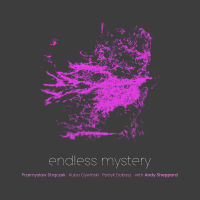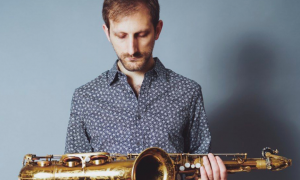Home » Jazz Articles » Interview » Borah Bergman: You Must Judge A Man By The Work of His Hands
Borah Bergman: You Must Judge A Man By The Work of His Hands
BB: Memorable because Tom was very ill. It's a nice record, but so are some others... I've been told that when somebody plays with me, it comes out differently. I think Roscoe (Mitchell), particularly the second one (The Italian Concert, Soul Note), plays differently, (and is) much warmer. But the reason is, well I can't say—I do feel very confident when I play duo...
AAJ: Is there an added comfort level, playing with horns?
BB: Well, first of all, I learned horn style on piano...So there isn't much a horn player can do that I don't know that he's doing it. Playing with horns, you get a lot of ideas from the horns.
AAJ: Would you ever be interested in performing with another pianist?
BB: Well, depends on the pianist. First of all if someone came and offered me $10,000 to play, I'm not going to say "no," but there's certain pianists that I would find interesting for certain reasons. You know, two pianists don't sound that great together. I mean, I already sound like two players sometimes!
AAJ: And have you ever thought about experimenting on the inside of the piano?
BB: Yes, I found it very boring. It's a technique that was developed through Cage and other people, and I don't see any point in doing it, and it's a little late (for me) to do it. It's been around for 50 years.
AAJ: What about the fact that musicians, probably more so now than ever, can't focus exclusively on their music these days? They need to split their time not only between playing, but the booking aspect, the self-promotion aspect, etc. It's not something that musicians can obviously afford to do, to have someone else to do that work for them to allow them to focus on their art. And ultimately, how much does that take away from the art form itself, if musicians can't dedicate the time that they need to with regards to playing?... And how do you get the world to hear the fact that Borah Bergman is out there playing?
BB: I spent a lot of time on developing. I'm pretty confident about what I'm doing, since I spent a lot of time learning to do it...the best I can do is to make records, maybe do concerts, but I do need somebody to get these concerts for me... I'm here to stay and I'm going to keep doing it [long pause], (but) get me a managers, a booking agents, somebody to get me jobs!
AAJ: You mentioned to me a mythical mentor you have.
BB: I never really had a true mentor, so I made one up. His name is Spindell Kresge. I referred to him in some previous interview and concert notes. He's running and somebody's chasing him. I don't know what the symbolism is—but he needs all the resources he has to get away from that person who's running after him. And when I play the piano with both hands, I need all the resources that I have to get away from somebody who is chasing me also. Who it is, I really don't know...So, the way I handle the left and right hand is very different from every other pianist who's improvising in the scene. Maybe they don't have somebody running after their mentor, as I do: Spindell Kresge. This is why I have the "double idea." If right hand makes a mistake, left hand takes over and corrects it, when the left hand makes a mistake, rightie takes over and corrects it.
AAJ: You mentioned you're like two piano players in one. Do you feel like two people playing?
BB: I don't feel any more like two people playing. I used to when I first started. I weave, and I turn around corners, but they're still after me. It's like an Ingmar Bergman film. Did you ever see The Seventh Seal? Somebody's after me.
AAJ: So, would it be a relief, or the exact opposite, if suddenly you weren't being chased while playing?
BB: I don't know. The thing is I know my own uniqueness. I learned everything I could from other people, then put myself in there also...I wouldn't say the notes are you, but the placement of the notes are you, that's the difference; I play like a horn not the piano, (and) I used to play the horn; it's a highly syncopated style; most free pianists play straight on the beat which I never do; my basic background is bebop, and "free" came into my playing a little later on, that's why you get a sense of buoyancy in my playing—you don't get a feeling of dead weight.
AAJ: When you play, do you have an image in your head, other than possibly being chased?
BB: I'm quixotic, or Quixote-like. I went to this psychiatrist, and we talked about wind mills. I think being quixotic in your playing is attractive. I don't know if it's a worthwhile thing in your life to be quixotic. Basically learning to play with the left hand, I had a sense of rebellion. Everybody's practicing with the right; I've got to practice with the left. So, now I'm in a very precarious situation. I have to decide what to do next! ...Of course, I do feel that I have a certain ability, so I can afford being myself.
AAJ: From your first records on Chiaroscuro to your last two, what do you feel your progression's been?
BB: Well, technically, I've come very far. I really can do this, this "ambi-ideation." I prefer not to use the word ambidexterity; I use "ambi-ideation." Because you don't know what ideas are in your head, until you get the equipment to get them out; it's amazing when you have the equipment to get them out, and you find, "Wow, these ideas, I was thinking them?!"
Suggested Listening
Borah Bergman, Discovery (Chiaroscuro, 1975)
Borah Bergman, The Human Factor (Soul Note, 1992)
Borah Bergman, Reflections on Ornette Coleman and the Stone House (Soul Note, 1995)
Borah Bergman/Thomas Chapin, Toronto 1997 (Boxholder, 1997)
Borah Bergman, Meditations for Piano (Tzadik, 2003)
Borah Bergman/Lol Coxhill/Paul Hession, Acts of Love Mutable Music, 2003)
Tags
PREVIOUS / NEXT
Support All About Jazz
 All About Jazz has been a pillar of jazz since 1995, championing it as an art form and, more importantly, supporting the musicians who make it. Our enduring commitment has made "AAJ" one of the most culturally important websites of its kind, read by hundreds of thousands of fans, musicians and industry figures every month.
All About Jazz has been a pillar of jazz since 1995, championing it as an art form and, more importantly, supporting the musicians who make it. Our enduring commitment has made "AAJ" one of the most culturally important websites of its kind, read by hundreds of thousands of fans, musicians and industry figures every month.






















